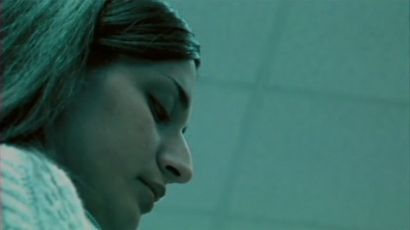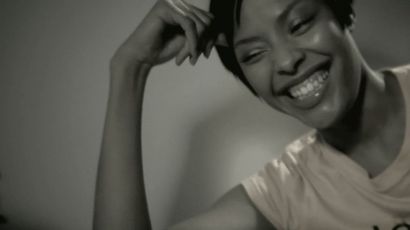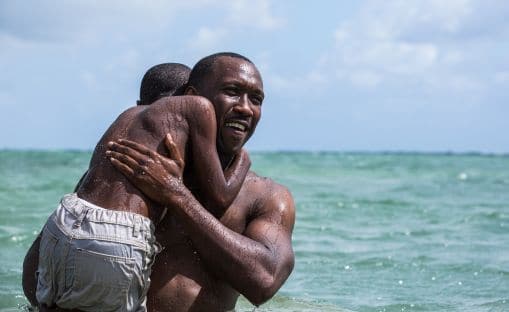What would have happened if Barry Jenkins had not decided in that hotel room in Austin nine years ago to send that e-mail to all the programmers and other film bobos in his South by Southwest festival catalogue? Would he then have ever Moonlight be able to make? The discovery everyone is talking about? The maverick that got eight Oscar nominations? But I'm getting ahead of myself.
We are in the packed main hall of the renovated KINO theatre in Rotterdam, where, on the first real festival day of the IFFR, guest of honour Barry Jenkins is giving a masterclass. Energetically, he steps onto the stage, then seems to wonder if moderator Tessa Boerman isn't heaping too much praise on him, before seizing on a microphone malfunction to briefly take control himself.
Chop & screw
Jenkins is not only a sudden celebrity, but also a filmmaker with a voice of his own, as Rotterdam likes to see. Moonlight and Jenkins' masterclass form a nice kick-off to the thematic programme Black Rebels, an overview of black cinema in America, then and now. The colour issue itself, by the way, only comes up very sideways in Jenkins' narrative here. This masterclass is about filmmaking, about sparring with the material, about the chop & screw technique borrowed from hip-hop and about how to use composition, colour and focus to get inside the head of the protagonist, the lone black Chiron in Miami.
Technique, aesthetics and the passion to open up the protagonist's world of experience to the viewer, the way Jenkins wants to express himself in the story, all appear to blend seamlessly. A simultaneously intuitive and lucidly analytical way of filmmaking with which Jenkins creates a sound all his own.
Harsh start
As did playwright Tarell McCraney, who wrote the first text for Moonlight delivered, Barry Jenkins also grew up in that same black neighbourhood of Miami. He had no idea, he tells KINO, that he could become a filmmaker. What he did have was that he wanted to achieve something. Florida State University is publicly funded. This allowed him to afford that education as the poor son of a drug-addicted mother. At first, he thought of becoming an English teacher. Then he thought about creative writing. Only then did he discover that there was a film school.
"That's how I tumbled into a creative vortex."
"I didn't know anything about film. Only that it was cool. And I knew the work of Spike Lee." On the first day there, aspiring filmmakers were handed a Bolex 16mm camera. Get to work. Months later, Jenkins still didn't understand it at all. A heavy-handed start. "Was I not getting the hang of the technique, or was it because I was a poor black boy and the others were all middle-class white guys?" he wondered.
A 'weird-ass' film
He took a year off to sort things out for himself. He realised that everyone was seeing the same films and, as a result, starting to make the same films. "There is nothing wrong with Spielberg, but I didn't want that," he said. So he decided to start seeing other films. The new wave from Asia. The French Nouvelle Vague.

In 2003, he shot his first short student film My Josephine, which takes place in a laundry washing American flags for free after 9/11. When he first saw the footage, he thought he had messed everything up. Then he learned what that strangely exposed material had to tell him and discovered how he could use it to create that dreamy atmosphere, how he could crawl into the world of the characters. He still thinks it's a weird-ass film.
"You don't control everything. There is luck and chance involved."
We then think: Jenkins does have exactly the right feeling to bend that coincidence to his will. From what first seems like a collection of anecdotes in this master class, the image of an organic way of making films gradually emerges.
$13,000 on a napkin
His first feature-length film Medicine for Melancholy (2008) he turned after someone pledged $13,000 to him on a napkin.

This reflection on love, hipster culture and being black in America premiered at the South by Southwest Film Festival in 2008. There were three screenings. At the first two, there was hardly any audience. To save the business, Jenkins and his cronies sprang into action in their hotel room and sent e-mails to all the programmers and other film professionals listed in the back of the festival catalogue. Someone from the Toronto film festival came to see and got the film there. Toronto is a real stage. That's how things got rolling for Jenkins.
"Luck and chance, but you have to take action yourself."
Moonlight

The text by Tarell McCraney, about his childhood in Miami, came to Jenkins by chance. Although Jenkins had grown up in the same neighbourhood, he hesitated, because it was the story of a gay boy. Jenkins is straight. But McCraney bestowed his trust on him. "So I was able to put myself into Chiron too - except for the sexual side," he said.
During a stay in Brussen, Jenkins wrote the screenplay for Moonlight.
Two producers of Brad Pitt's Plan B Entertainment, meanwhile, were fans of Medicine for Melancholy and picked up Jenkin's new project. "I was able to make it exactly the way I wanted," he says. "Brad Pitt opened doors for me and let me do my own thing."
To which, incidentally, Jenkins does not fail to give praise to his collaborators. The now Oscar-nominated editors Joi McMillon and Nat Sanders, for instance. Or others who opened his eyes. Like Scotland's Lynn Ramsey (Ratcatcher), who showed him how great it can be to work with non-professional actors because they have not yet learned to rely on tricks.
People matter
"I also learned more from my fellow students from the teachers," he remembers noting about his time at film school in Florida. People matter. It will be no coincidence that he continued to work with many of the same people. James Laxton, who produced the images for My Josephine shot, is also the cameraman of Moonlight. And when an art student asks him how he achieves that intimacy and authenticity, he replies that he tries to create that feeling already on set. Jenkins appears to enjoy giving art students advice. "You're young, take your time. And try to find someone who understands what you want."
They are sounds that make one optimistic again. Perhaps after Moonlight in the US film industry are more people who think, 'Hey, it doesn't always have to follow pre-baked formulas.' Let's dream of new opportunities for American filmmakers with their own voice.
Moonlight is now running in cinemas. Medicine for Melancholy is still running at LantarenVenster on Sunday 29 January. IFFR is screening several short films by Jenkins and My Josephine can also be viewed online.
